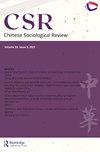Instrumental voting under authoritarianism: evidence from Chinese village elections
IF 1.4
2区 社会学
Q2 SOCIOLOGY
引用次数: 4
Abstract
Abstract Using data on 8,872 voters in 209 villages from Chinese Family Panel Studies, this paper uncovers compelling evidence of instrumental voting in the context of Chinese rural elections. First, voter turnouts are significantly higher in villages where rural committees control greater income opportunities and provide more public goods; second, voters’ economic reliance on these income opportunities and public goods is found to be positively correlated with their participation; third, the effects of economic reliance are more pronounced and precisely estimated in resource-affluent villages. One theoretical implication of our findings is that authoritarian elections can be instrumentally appealing enough to elicit mass interest while leaving intact the essence of an authoritarian regime’s rule.威权主义下的工具投票:来自中国乡村选举的证据
本文利用中国家庭小组研究对209个村庄的8872名选民的数据,揭示了工具投票在中国农村选举背景下的令人信服的证据。首先,在农村委员会控制更多收入机会并提供更多公共产品的村庄,投票率明显更高;第二,发现选民对这些收入机会和公共产品的经济依赖与他们的参与呈正相关;第三,在资源丰富的村庄,经济依赖的影响更为明显和准确。我们的研究结果的一个理论含义是,专制选举可以在保持专制政权统治的本质不变的同时,在工具上吸引足够多的人来吸引大众的兴趣。
本文章由计算机程序翻译,如有差异,请以英文原文为准。
求助全文
约1分钟内获得全文
求助全文

 求助内容:
求助内容: 应助结果提醒方式:
应助结果提醒方式:


